Corporate Social Responsibility: Building your brand, getting it right
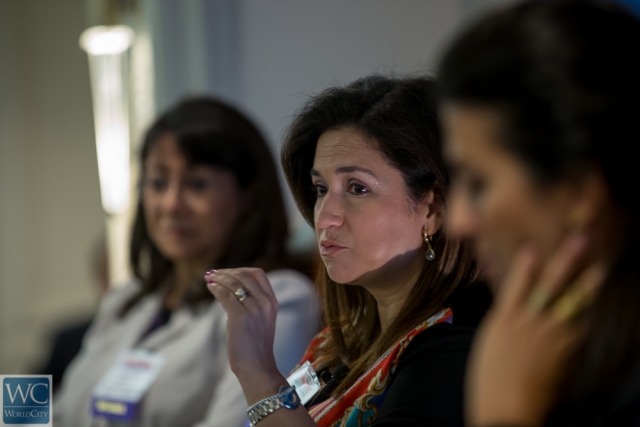
To help low-income children in Latin America, Discovery Networks is partnering with cable and satellite operators to provide schools with pay-TV connections. In some cases, that effort means donating solar panel systems too, because the schools lack electricity to run the TVs all day. And in most cases, it also means training the teachers on how to use TV programs to promote discussion and engagement.
That was just one example of corporate outreach discussed at WorldCity’s Global Connections on June 27 and addressing “Corporate Social Responsibility: From PR Ploy to Brand Builder.”
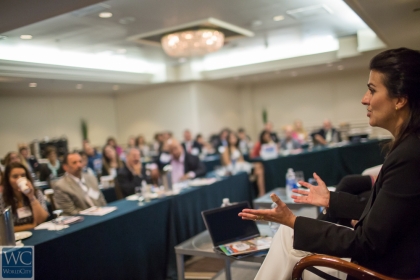
Evelyn Zapata, a senior director for Visa in Latin America and the Caribbean
Panelists shared experiences from software maker Microsoft, financial services giant Visa and TV group Discovery. They said companies increasingly align outreach with their business mission and expertise. For example, Discovery focuses on education, Microsoft on helping youth and women learn digital skills, and Visa on boosting financial education and inclusion for the unbanked.
“The universe of philanthropy is almost infinite. We have to be strategic,” said Evelyn Zapata, a senior director for Visa in Latin America and the Caribbean in charge of communications , corporate social responsibility and other programs for the region. “We can’t do it all.”
How to develop effective outreach programs
Finding outreach programs that work are sometimes harder than they seem.
Discovery found that many teachers in low-income areas had never watched pay-TV themselves and had no idea what the shows could offer students, never mind how to access all the channels.
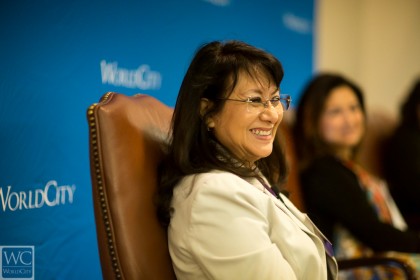
Maria Teresa Velasco, manager of education and public affairs for Disovery Networks Latin America/US Hispanic.
“It’s amazing how many people in Latin America have a cellphone and don’t know how to use a remote control,” said Maria Teresa Velasco, manager of education and public affairs for Disovery Networks Latin America/US Hispanic. “We have to teach them to enjoy the technology.”
Microsoft’s centers that teach digital skills to women have under-performed in Latin America, partly because many care-givers can’t take time off during work hours or even on weekends, said Angela Camacho, regional director of legal and corporate affairs for Microsoft Latin America (pictured above center).
Microsoft also has learned to adapt content at those centers toward entrepreneurship, so that women who do receive the training can find new ways to work from their homes, said Camacho.
For Visa, games and comics have proved popular to bring financial skills to the underserved in Latin America. The company has developed an interactive game that uses soccer to teach financial basics. And its comic book superheroes teach “how to save money and save the planet,” said Zapata.
A big challenge remains, however: How to find ways to work with more nonprofits, universities, governments and other companies on common goals to boost the impact of all their separate community work, Zapata said.
Measuring impact, being sustainable
Audience members posed questions on everything from setting goals to motivating employees.
How do you measure your impact?, asked Gloria Barbier, a financial advisor with AXA Advisors.
“It all starts with goals,” said Microsoft’s Camacho. For example, the company has set a goal to reach 60 million youth in Latin America with its training programs over three years, and so far, has reached 35 million. It tracks results for that outreach as part of its normal business reporting, she said.
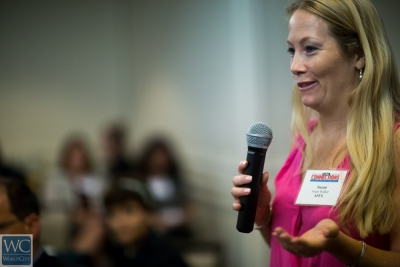
Susan Walker, who runs the Miami office of foreign currency specialists AFEX.
While efforts by Microsoft and others to develop entrepreneurship programs are noble, what about tracking how long new businesses last?, asked Juan Casimiro, chairman of the Casimiro Global Foundation.
“I get very concerned when we help micro-enterprises get started and then, there’s not enough support for sustainability,” Casimiro told an audience of more than 70 people at Global Connections.
How do you answer critics who claim that corporate social responsibility programs are just another way to get clients?, asked Susan Walker, who runs the Miami office of foreign currency specialists AFEX.
“It’s about giving people tools to empower themselves,” said Visa’s Zapata. “And the scrutiny we get from you, the media and others makes us work harder to make sure we get it right.”
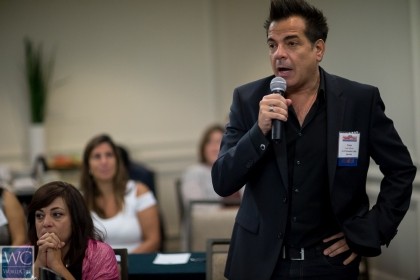
Cesar Sabroso, senior vice president of marketing at A+E Networks
Cesar Sabroso, senior vice president of marketing at A+E Networks, backed the community efforts, called them “never enough” and offered to collaborate from his company.
“We can do great things together to empower people,” Sabroso said, decrying those who complain and insisting “at the end of the day, life is too short.”
Ensuring employee engagement
Within companies themselves, how do you engage employees in the outreach efforts?, asked Francia Baez Guzman, managing partner at human resources specialists FBG Consulting.
“It’s very important to have the right tone at the top,” said Microsoft’s Camacho. It helps, for example, when senior executives turn out for volunteer events and show their passion for the initiatives.
The efforts go beyond brand-building and constitute part of broader strategy, panelists said.
Not long ago, corporate communications and public relations were considered “warm and fuzzy” fields, and now, they’re considered to add real value for companies, said attendee Sofia Perrazo, an executive director for the Cisneros Group of Companies in the Dominican Republic.
“Corporate Social Responsibility adds real value,” said Perrazo. “You have to make business sustainable and communities sustainable.”
Global Connections is one of six event series organized by media company WorldCity to bring together executives in greater Miami on international business topics. The Global series is sponsored by Florida International University School of Business, public relations firm Edelman, real estate company Waterford and air-conditioner maker Daikin.
The next Global Connections is set for July 25 on the topic, “Health Care Americas: The Path to Transforming a Region.”